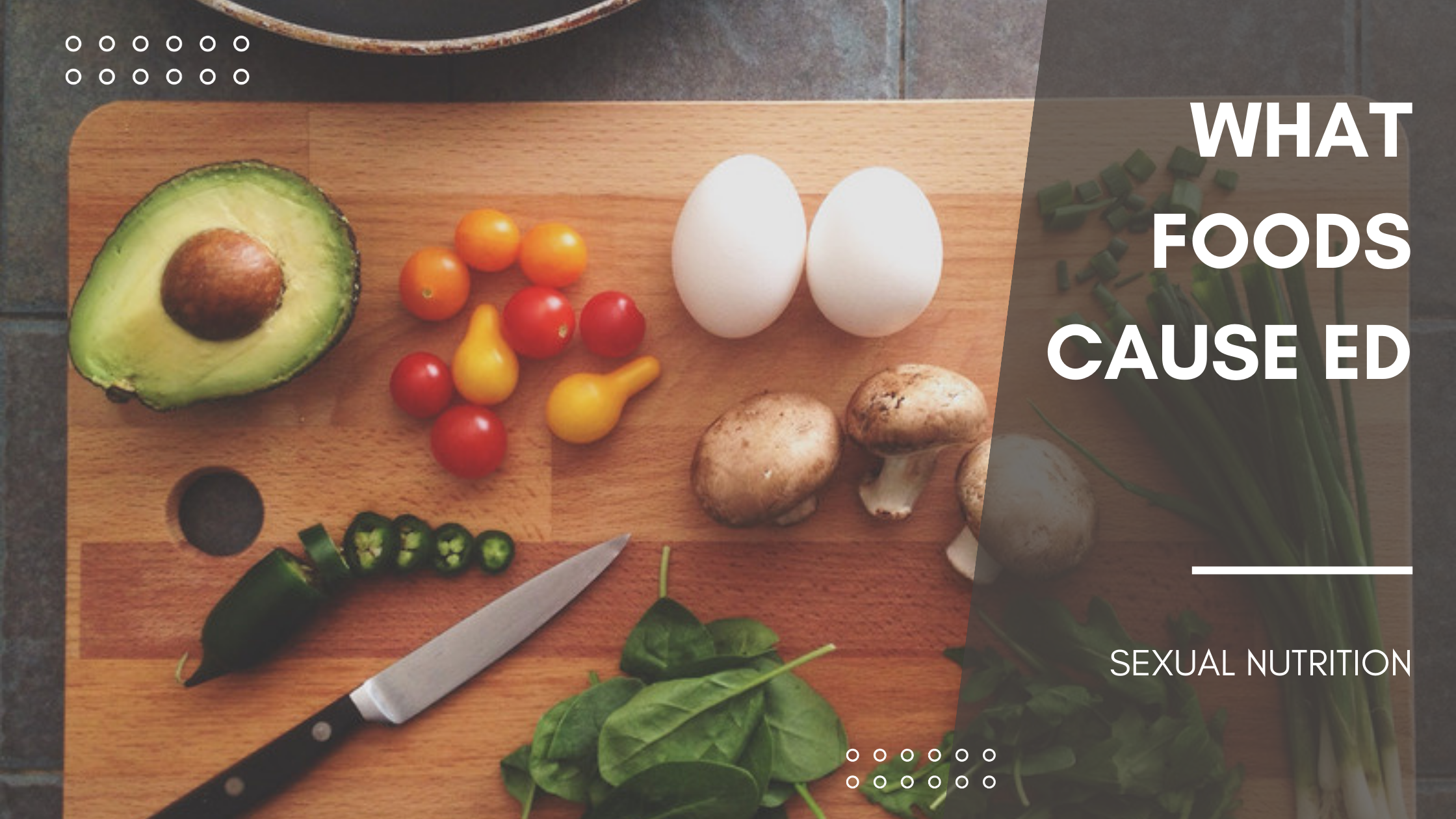
What Food Causes ED?
Erectile dysfunction (ED) is the persistent inability to achieve or maintain an adequate erection suitable for intercourse. Lifestyle choices such as nutrition and exercise play a large role in sexual health. In this article, we will be discussing nutritional biochemistry and what food causes erectile dysfunction.
We will also discuss nutritional strategies for improving overall health and sexual function. Dietary strategies for reaching an ideal body weight will be addressed and we will cover some specific macro and micro nutrients and their relationship to erectile dysfunction.
Sexual Dysfunction can be a Medical and a Food Issue.
Erectile dysfunction is a medical problem until proven otherwise. While psychological factors can lead to erectile dysfunction, organic issues are more common and warrant medical evaluation. Diseases that impact the blood vessels, nerves, penile tissues and sex hormones can lead to erectile dysfunction. Our food choices can impact our likelihood of developing erectile dysfunction.
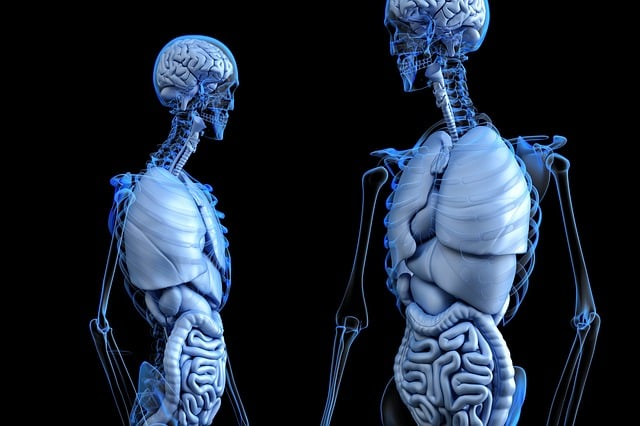
Diagnostic Considerations.
The diagnosis of erectile dysfunction should start with a complete medical history by a urologist, a sexual medicine expert. Sexual history should include an assessment of sexual desire along with sex life details. Blood pressure, body weight and BMI should be docuented.
The physical needs to include the cardiovascular, neurologic and genital systems.
Laboratory investigation must evaluate sex hormones, kidney and liver function, thyroid health, blood counts and lipids.
Sometimes an underlying cause for the ED will be identified such as low testosterone. Treatment with testosterone may cure erectile dysfunction in this case.
Some men experiencing erectile dysfunction may benefit from penile doppler ultrasound and cardiovascular imaging.
ED Risk Factors such as High Blood Pressure.
When evaluating a patient with impaired sexual function we assess their underlying medical conditions. Erectile dysfunction risk indicators include high blood pressure, high cholesterol, obesity, insulin resistance, smoking, excessive drinking, digestive and kidney diseases and cardiovascular disease.
Addressing health issues and chronic disease early can prevent men from developing erectile dysfunction in the first place by maintaining healthy blood vessels. Nutritional strategies can treat insulin resistance and hypertension.
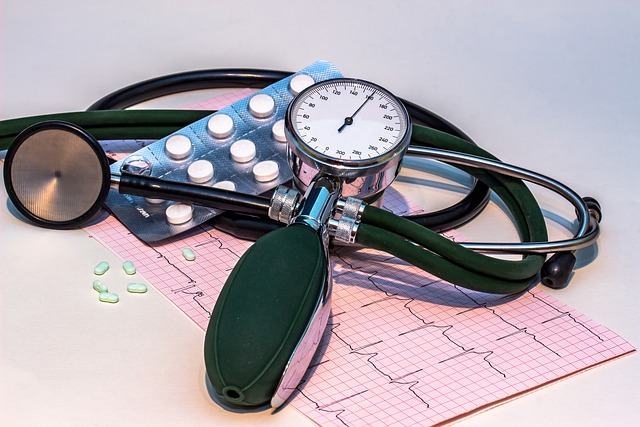
Treatment of Erectile Dysfunction.
Risk factors such as high cholesterol and diabetes must be aggressively managed with lifestyle modification or medical intervention. Modifying the foods we eat will have a big role here and can not only treat ED but prevent erectile dysfunction progression.

Once risk modifiers are identified and dealt with, urologists will consider a variety of therapies to treat ED through improved blood flow.
Whole Food Balanced Nutrition.
A whole food balanced diet is vital for good blood flow in the penis and serves to maintain a healthy cardiovascular system. Believe it or not, good nutrition can actually treat erectile dysfunction.
In the following sections, we will discuss the importance of maintaining an ideal body weight to promote metabolic health and reduce blood pressure and address some of the worst foods for erectile dysfunction.
We will also discuss how foods may treat erectile dysfunction and how a healthy diet with unprocessed foods promotes healthy erections, avoids nutritional deficiencies and provides other health benefits.
The Basics of a Whole Food Balanced Diet.
Whole food diets imply the avoidance of processed foods. Any food product that has something added or taken away can be consider processed. Mother nature’s kitchen is always the healthiest way to go so look to consume a diet of real foods. If it’s in a bag or a box it’s probably not real food.
Some foods are minimally processed while others are ultra processed. In general, the more processed the food, the more unhealthy the food.
A balanced diet means that adequate macro and micronutrients are obtained on a daily basis. Healthy diets such as the Mediterranean diet consist of healthy lean protein sources, ample healthy fats and unrefined carbohydrates.
Balanced diets must also contain foods rich in micronutrients such as low sugar fruits, vegetables, nuts, seeds, legumes and whole grains. Remain in the periphery of the grocery store to find the real food. Fresh vegetables, fruits, meat, chicken, fish and eggs. I only leave the periphery of the grocery store to get coffee, olive oil, beans, nuts, seeds and some whole grains.
Learn how to read food label because these are warning labels. Chances are you buying processed food if it has a label. But, not all minimally processed foods are bad. Look at the ingredients which should be few and far between if minimally processed. Also, make sure there is no added sugar.
The Obesity Epidemic.
Roughly 2 out of every 3 Americans are overweight while 1 in 3 meet the criteria for obesity and this leads to metabolic derangements including hypertension, elevated cholesterol and triglycerides, insulin resistance, fatty liver disease and chronic inflammation. These metabolic issues wreak havoc on blood vessels and have a negative impact on penile blood flow and erectile function.
If male subjects are overweight or obese they need to lose weight, period. Weight gain causes metabolic derangements that increase the risk of heart disease and erectile problems. Men with ED symptoms may actually have undiagnosed vascular disease.
Positive lifestyle factors including a healthy diet and exercise are vital to reverse the metabolic abnormalities associated with excess body fat.
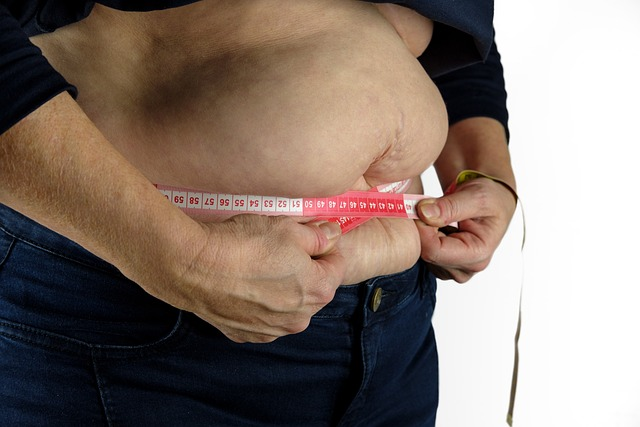
Dietary Strategies to Improve Body Composition.
There are basically three dietary strategies for sustainable weight and they all work by reducing calories. There is nothing magical about any particular. Fewer calories is the key. The most important aspect of dieting is adherence.
Calorie Restriction.
Calorie restriction requires calorie counting and reducing total caloric intake to a level that leads to weight loss. A calorie deficit is required, meaning you must consume fewer calories than you burn. This strategy is also called flexible dieting. It allows you to eat any food as long as you remain in a calorie deficit.
Dietary Restriction.
Dietary restriction involves the elimination of particular foods in the diet. A food “boogeyman” is identified and these worst foods are avoided to achieve weight loss. These are the diets we typically hear about in the news such as low fat diets, keto diets and whole food diets.
Either fat, carbohydrates or processed foods are avoided. If done correctly, these diets work by reducing caloric intake. It may be as simple as eliminating sugary sodas, fried foods or saturated fats in the diet.
Time Restriction.
Time restriction can be accomplished with time restricted feeding or intermittent fasting.
Macronutrients.
With the exception of protein, the distribution of macronutrients is not that important when it comes to weight loss as long as healthy foods are consumed. Protein is unique because it is not a source of energy. Protein is broken down into amino acids which we use to build muscle, make enzymes and immunoglobulins.
Protein intake is key regardless of dietary weight loss strategy. We should consume about 1 gram of protein per pound of body weight per day.
Dietary Adherence.
Once we equate for protein intake, most dietary strategies are equivalent when adhered to. If you prefer low carb eat healthy fats. If you enjoy carbohydrates, reduce greasy foods and consume unrefined carbohydrates.
Protein Intake.
Again, protein is a very important macronutrient. We need adequate protein intake in order to build lean muscle mass and maintain a functional immune system. Increasing lean muscle mass leads to a multitude of health benefits. Muscle is a metabolic sink for glucose so it’s a great way to avoid insulin resistance and burn energy.
Animal Protein.
Animal protein is more bioavailable than plant protein and contains all of the essential amino acids. Stick to lean sources with the exception of fatty fish like salmon. If you like steak, try to stick with lean cuts. Chicken breast is quite lean and egg whites are pure protein. Greek yogurt is a good source of high quality protein.
Fatty cuts of meat are tasty but contain more saturated fats. Consuming saturated fat tends to increase LDL-cholesterol and triglycerides which impair blood flow. Like fried foods, saturated animal fats can damage blood vessels leading to poor cardiovascular health.
Animal protein is far healthier when obtained from grass fed, free range organic farms. Corn fed beef would fall into the category of processed food. Corn fed cows are metabolically unhealthy and the marbling represents intra-myocellular fat.
Plant Protein.
Great sources of plant protein include legumes, nuts, soybeans, mushrooms and whole grains. Plant protein not as bioavailable as animal protein and most plant protein is not a complete protein. This means it does not contain all of the essential amino acids like animal proteins. Plant based diets can be very healthy but it takes effort to maintain adequate high quality protein intake.
Protein Supplementation.
My wife is a vegan and she supplements her diet with plant based protein powders to make sure she hits her 1 gram per pound per day goal of protein intake. If you are an omnivore, whey protein isolate is a great source of protein.
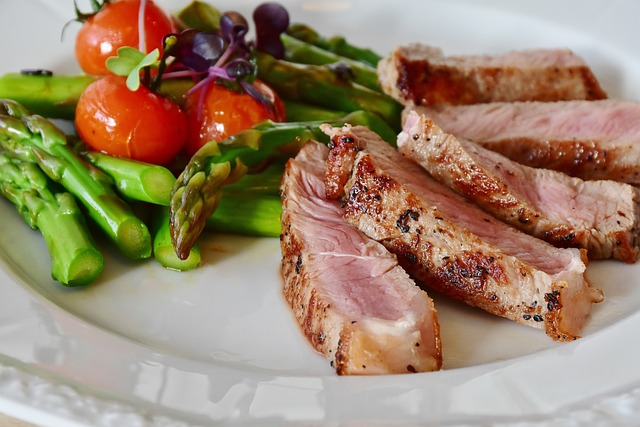
Carbohydrates.
There is nothing inherently wrong with carbohydrates despite the fact that many diets promote low carbohydrate intake.
Great sources of carbohydrates that are good for erectile function would include beans, lentils, low sugar fruits like berries, whole grains and vegetables. Vegetables are one of the healthiest foods on earth. Green leafy vegetables are rich in dietary nitrate which is great for heart health.
Saturated and Trans Fats.
Saturated fats are probably one of the worst foods for erectile dysfunction but “healthy” fats may be good for erectile function by improving sex hormones and reducing inflammation that impairs nitric oxide production.
Saturated fat is found in animal fat, such as meat and dairy products. It can also be found in plant sources such as coconut oil.
The only thing worse than saturated fats for our sex life are trans fats. Trans fats have largely been eliminated from the food supply but can be created if cooking with olive oil beyond it’s smoking point.
Unsaturated Fats.
Healthy fats include monounsaturated and polyunsaturated fats. High fat meals containing healthy fats tend to be rich in omega 3 fatty acids, one of the best foods we can consume.
Good sources of healthy fats include olive oil, avocado, nuts, seeds and salmon. Avoid processed vegetable oils like safflower oil because they tend to contain high levels of omega 6 fatty acids.
Sugar.
Sugar can mean a few things but what I’m referring to is mainly added sugar in the food supply. Added sugars usually come in the form of sucrose, fructose and high fructose corn syrup.
Sugar is one of the worst foods for erectile dysfunction and added sugar is one of the dietary components in 70% of the foods found in your local grocery store. Sugar is addictive and the food industry knows it. That’s why they add it to just about everything on the shelf.
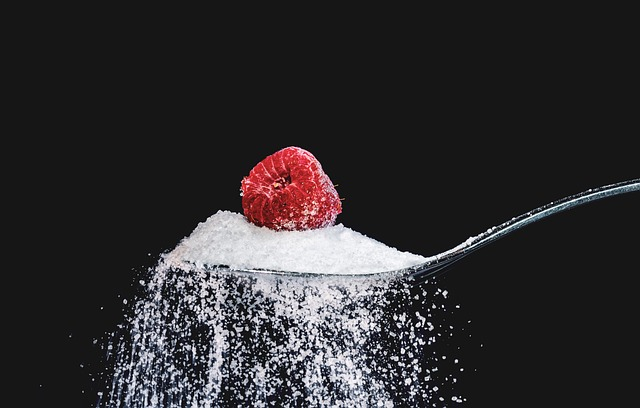
Sugar and Insulin Resistance.
Consuming a lot of sugar and refined carbohydrates will lead to high blood sugar and insulin resistance. This causes endothelial dysfunction, reduced nitric oxide and poor erectile function.
Fructose.
Fructose should be avoided unless it’s contained in fiber rich fruit. Avoid sugary sodas, most of the food in the grocery store containing added sugar and fruit juices.
Added sugar is the enemy so read food labels and make sure there isn’t added sugar in your diet.
Processed Foods.
Processed foods are unhealthy to consume for a variety of reasons. They tend to be high in sugar and low in fiber. Processed foods are highly palatable leading to excessive calorie consumption.
Processed foods are nutrient deficient so they are one of the worst foods for erectile dysfunction. They also tend to be high sodium foods and salty foods are bad for metabolic health.
Overall health is better served by eating real whole foods that are unprocessed or minimally processed.
Fiber.
Eat plenty of soluble and insoluble fiber. Fiber is important for a variety of reasons, none more important than maintaining a healthy gut microbiome. Fruits, vegetables, legumes and unrefined grains are great sources of fiber.
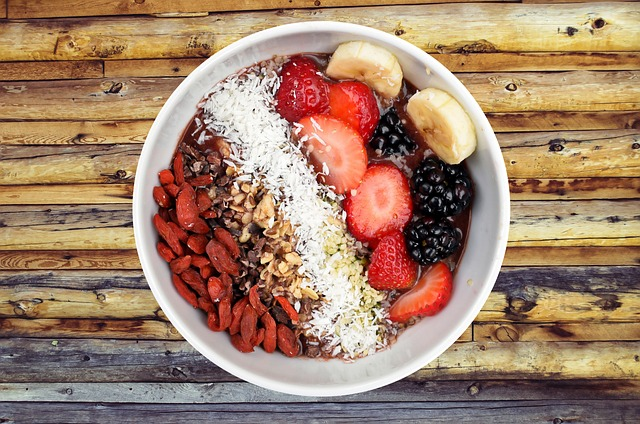
Fruits and Vegetables.
Fruits and vegetables are some of the healthiest foods on earth, so they should be consumed copiously. Vegetable consumption should include green leafy vegetables, cruciferous vegetables, mushrooms, and other vegetables. Variety will provide a multitude of micronutrients.
Variety is also great with fruits, but focus on low-sugar fruits like berries and kiwi. Berries are loaded with micronutrients, antioxidants, and fiber. I prefer these fruits compared to fruits like apples and bananas, which tend to be low in fiber and sugar-rich.
Studies have shown that high animal protein diets can be very healthy when a high fruit and vegetable intake is maintained.
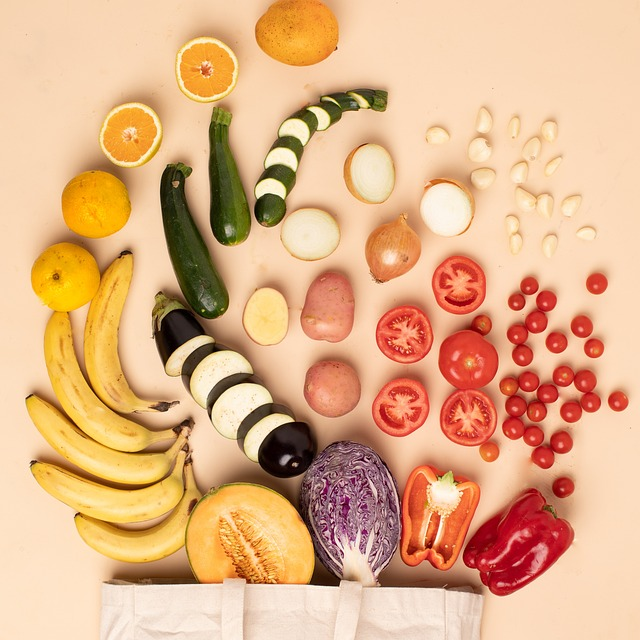
Alcohol Consumption.
Alcohol leads to erectile dysfunction and other health issues such as high blood pressure and cardiovascular disease. No amount of alcohol is healthy, period. Alcohol dependence requires medical attention. If you must drink alcohol, try to keep it to 1-2 drinks weekly.
Alcohol is also pure sugar, something we know is not metabolically healthy to consume.
Conclusions.
Nutrition is an important component of sexual health. If overweight, choose a dietary strategy that you can adhere to. Your diet should be well balanced with fruits, vegetables, legumes, nuts, seeds and unrefined grains. Ensure adequate protein intake. Make a concerted effort to avoid sugar while eating plenty of fiber. Avoid excessive alcohol consumption. .
